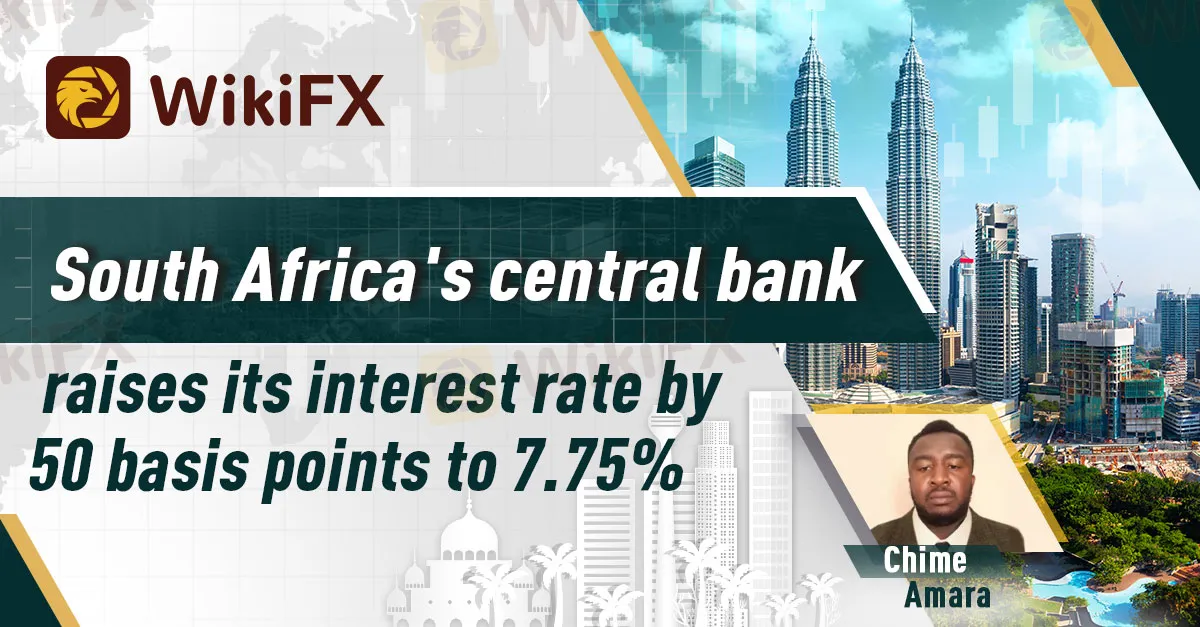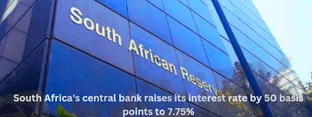简体中文
繁體中文
English
Pусский
日本語
ภาษาไทย
Tiếng Việt
Bahasa Indonesia
Español
हिन्दी
Filippiiniläinen
Français
Deutsch
Português
Türkçe
한국어
العربية
South Africa's central bank raises its interest rate by 50 basis points to 7.75%
Abstract:South Africa's central bank has raised its main lending rate by 50 basis points to 7.75% last week's Thursday in an effort to curb it's rising inflation rate.

By: Chime Amara

South Africa's central bank has raised its main lending rate by a surprising 50 basis points to 7.75% in an effort to curb it's rising inflation rate. The current hike came much higher than the market expectations of just 25 basis points.
This marks the ninth consecutive time the South African Reserve Bank has raised rates, adding a total of 425 bps to the repo rate since tightening policy in November 2021.
The move comes after February consumer inflation in South Africa rose to 7.0% year on year from 6.9% in January, indicating that nationwide power cuts may be driving price pressures. The central bank aims to keep inflation between 3% and 6%.
The Monetary Policy Committee was divided in its decision, with three members advocating for a 50 bps increase and two favoring a 25 bps increase. Central bank governor Lesetja Kganyago cited risks to the inflation outlook, stating that despite easing of producer price and food inflation, global price levels remain elevated, while electricity prices and other administered prices present short- and medium-term risks.
Kganyago also noted that the headline inflation rate in South Africa has been primarily driven by fuel, electricity, and food price inflation. He further revealed that he expects food and fuel inflation to ease gradually, up to 4.9% by 2024 and 4.5% in 2025.
Market analysts expressed surprise at the central bank's decision, with some noting that the higher outlook towards food and core goods inflation prompted the move. FNB Chief Economist, Mamello Matikinca-Ngwenya, said the road ahead is precarious, indicating uncertainty in the economic growth prospects. The rate hike has also triggered a surge in the rand, which rose nearly 2% against the dollar.
Overall, the central bank's decision to raise interest rates by 50 basis points is a sign of its determination to address rising inflation, even if it comes as a surprise to many market analysts. The impact of the rate hike on the South African economy remains to be seen, but the central bank's cautious approach suggests that it is closely monitoring the situation and taking steps to address any risks to economic stability.

Disclaimer:
The views in this article only represent the author's personal views, and do not constitute investment advice on this platform. This platform does not guarantee the accuracy, completeness and timeliness of the information in the article, and will not be liable for any loss caused by the use of or reliance on the information in the article.
Read more

The Hidden Checklist: Five Unconventional Steps to Vet Your Broker
Forex broker scams continue to evolve, employing new tactics to appear credible and mislead unsuspecting traders. Identifying these fraudulent schemes requires vigilance and strategies beyond the usual advice. Here are five effective methods to help traders assess the legitimacy of a forex broker and avoid potential pitfalls.

Doo Financial Obtains Licenses in BVI and Cayman Islands
Doo Financial, a subsidiary of Singapore-based Doo Group, has expanded its regulatory footprint by securing new offshore licenses from the British Virgin Islands Financial Services Commission (BVI FSC) and the Cayman Islands Monetary Authority (CIMA).

CFI’s New Initiative Aims to Promote Transparency in Trading
A new programme has been launched by CFI to address the growing need for transparency and awareness in online trading. Named “Trading Transparency+: Empowering Awareness and Clarity in Trading,” the initiative seeks to combat misinformation and equip individuals with resources to evaluate whether trading aligns with their financial goals and circumstances.

Malaysian-Thai Fraud Syndicate Dismantled, Millions in Losses Reported
The Royal Malaysia Police (PDRM) has received 26 reports concerning the Nicshare and CommonApps investment schemes, both linked to a major fraudulent syndicate led by a Malaysian citizen. The syndicate’s activities came to light following the arrest of its leader by Thai authorities on 16 December.
WikiFX Broker
Latest News
ASIC Sues Binance Australia Derivatives for Misclassifying Retail Clients
WikiFX Review: Is FxPro Reliable?
Malaysian-Thai Fraud Syndicate Dismantled, Millions in Losses Reported
Trading frauds topped the list of scams in India- Report Reveals
AIMS Broker Review
The Hidden Checklist: Five Unconventional Steps to Vet Your Broker
YAMARKETS' Jingle Bells Christmas Offer!
WikiFX Review: Something You Need to Know About Markets4you
Revolut Leads UK Neobanks in the Digital Banking Revolution
Fusion Markets: Safe Choice or Scam to Avoid?
Currency Calculator


